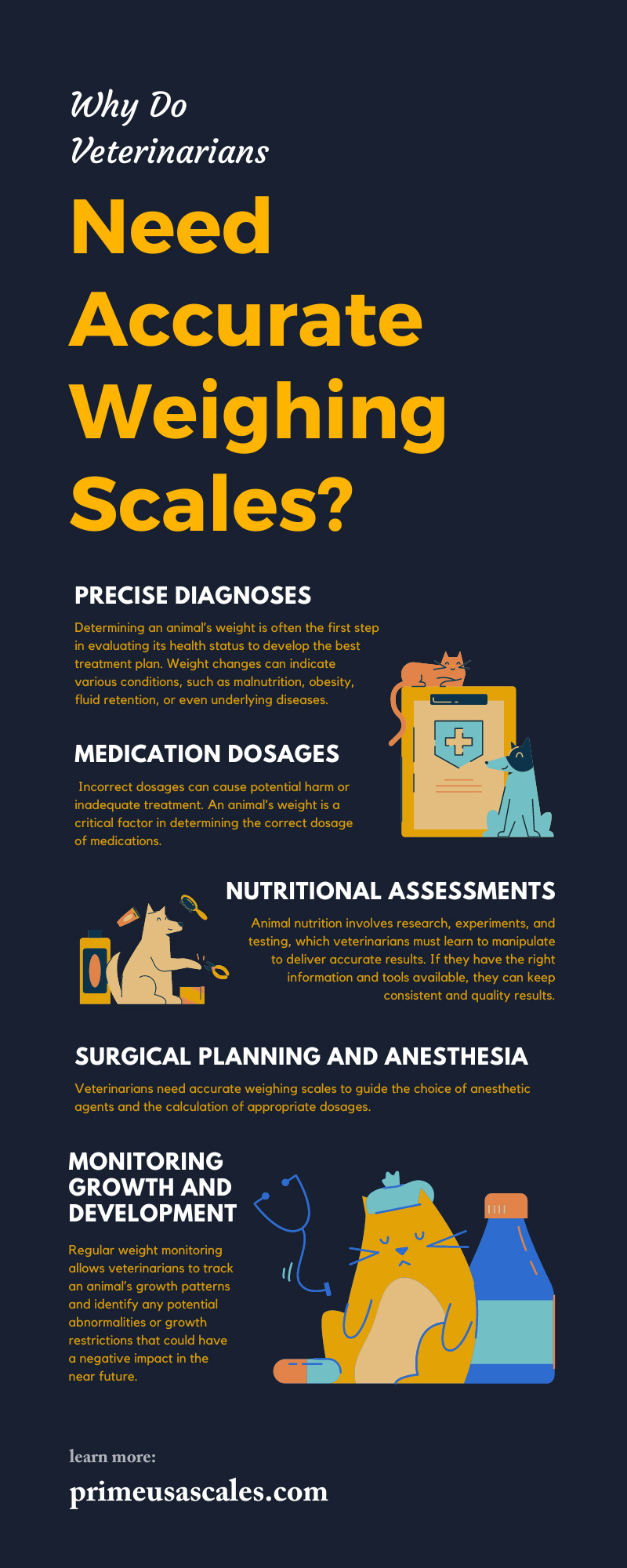
Veterinarians are professionals who dedicate their lives to the well-being and health of pets, domestic animals, wild animals, and other creatures. In their tireless efforts to diagnose and treat animals, they rely on a wide range of tools and technologies to get positive results.
One essential tool in veterinary practices is a weighing scale. Modern technology and innovation keep presenting new solutions to enhance existing tools or create new ones that deliver consistent results with minimal errors.
There are multiple reasons why veterinarians need accurate weighing scales, including medication dosages, nutritional assessments, and overall animal care. Specialized tools with the right characteristics will help veterinarians monitor animal development to ensure good quality of life.
Precise Diagnoses
Accurate weighing scales help veterinarians make precise diagnoses. Determining an animal’s weight is often the first step in evaluating its health status to develop the best treatment plan. Weight changes can indicate various conditions, such as malnutrition, obesity, fluid retention, or even underlying diseases.
By consistently monitoring an animal’s weight over time, veterinarians can detect subtle changes and rapidly address emerging issues. Accurate weights also determine the effectiveness of treatment plans and ensure the appropriate allocation and distribution of resources for each patient.
Medication Dosages
Administering medication in veterinary practice requires precision. Incorrect dosages can cause potential harm or inadequate treatment. An animal’s weight is a critical factor in determining the correct dosage of medications. Too much medicine for a small animal could be catastrophic.
Accurate veterinary scales allow veterinarians to calculate the precise amount of medication required, ensuring optimal results and engagement. Precision and accuracy are essential when treating smaller animals or for medications with specific weight-based guidelines.
Nutritional Assessments
Dietary management is one of the main characteristics of animal health, and weight monitoring is an essential part of assessing an animal’s nutritional status. Accurate weighing scales enable veterinarians to determine whether an animal is underweight, overweight, or maintaining an ideal weight.
This information helps them develop nutritional plans and recommend appropriate diets for animals with individual goals. Regular weight checks also allow veterinarians to assess the animal’s response to any dietary modifications the owner made. This can help them see the animal’s progress or make changes to the nutrition plan.
Animal nutrition involves research, experiments, and testing, which veterinarians must learn to manipulate to deliver accurate results. If they have the right information and tools available, they can keep consistent and quality results.
Surgical Planning and Anesthesia
For veterinarians prepping an animal for surgery or administering anesthesia, knowing the animal’s weight is necessary to prevent unwanted reactions in the body. Veterinarians need accurate weighing scales to guide the choice of anesthetic agents and the calculation of appropriate dosages.
Professionals must administer anesthesia with great care to avoid complications, and knowing the precise weight of an animal allows veterinarians to deliver anesthetic agents safely and effectively. This ensures the animal’s well-being during the procedure and aids in a smooth recovery to minimize post-surgery complications, like disorientation or sickness.
Monitoring Growth and Development
Animals, especially in their early stages of life, experience rapid growth and development, but it doesn’t mean that the animal is healthy and strong. Regular weight monitoring allows veterinarians to track an animal’s growth patterns and identify any potential abnormalities or growth restrictions that could have a negative impact in the near future.
It enables them to detect nutritional deficiencies, hormonal imbalances, or underlying health conditions that may damage and slow healthy development. By closely monitoring weight shifts, veterinarians can intervene immediately, providing appropriate procedures to ensure the well-being of young animals.
Farm animals, mainly, require strict growth and development monitoring because some have specific purposes. With the help of veterinarians, farmers can ensure that their animals and production stay active.
Detecting Fluid Retention and Dehydration
Accurate weighing scales are indispensable for assessing fluid retention or dehydration in animals, especially farm animals that spend most of their time outdoors. These conditions can arise due to various factors, like heart or kidney diseases, gastrointestinal disturbances, or fluid imbalances, and it’s important to know the root of the cause.
By comparing an animal’s weight over time, veterinarians can detect and monitor fluctuations that indicate fluid retention or dehydration. This information assists in developing treatment plans, implementing fluid therapy, preventing further complications, and preventing other animals from suffering the same illness.
Animal Health Management
In addition to diagnosing specific conditions and solving important health problems, accurate weighing scales contribute to overall health management. Routine weight checks help veterinarians ensure that animals maintain a healthy weight, reducing the risk of obesity-related diseases and joint problems.
They also allow for better management of chronic conditions, such as diabetes or kidney disease, by monitoring weight changes that might indicate disease progression or a response to the treatment. By employing accurate weighing scales, veterinarians can proactively address potential health issues and improve the animal’s quality of life.
Research and Data Collection
Accurate weighing scales also support veterinary research and data collection efforts for future reference and procedures. By collecting precise weight measurements for various species, researchers can establish weight ranges, growth patterns, and other vital statistics for different animal populations.
This data aids in developing evidence-based guidelines, advancing veterinary medicine, and improving treatment for animals worldwide. Sharing information about studies and research will benefit everyone.
In the world of veterinary practice, accurate weighing scales are invaluable tools. They allow veterinarians to successfully implement knowledge and perform various techniques. These scales play an important role in all aspects of veterinary practice, from diagnosing health conditions and determining appropriate medication dosages to monitoring growth and managing animal welfare.
By ensuring precise weight measurements, veterinarians can make informed decisions, deliver effective treatments, and enhance the overall well-being of their animal patients. As technology continues to advance, the importance of accurate weighing scales will remain active, allowing veterinarians to protect the health and happiness of animals everywhere.
At Prime Scales USA, we’re an expert company in scales and equipment distribution. If you own a veterinary clinic in need of accurate scales, call us today to find the best veterinary scale for your business.